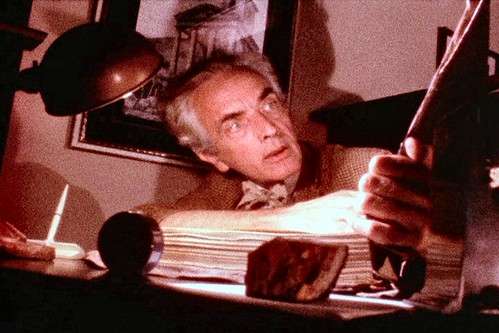Sunday, December 28, 2014
Wednesday, December 17, 2014
Thursday, October 16, 2014
Fritz Leiber
Friday, August 22, 2014
Beachy Reading
We went to the coast for several days and I grabbed a bunch of golden age archive editions from the library to give the kids something new to look at for the drive out and back. Included was a volume of Wonder Woman, Batman, Plasticman, and All Star Comics. I've never been terribly impressed by DC titles but thier Golden Age stuff really works for me. The above sequence of Doctor Mid-Nite and Wonder Woman getting trapped under the Liberty Bell and thier rather silly but logical solution to this plight seems as close to an embodiment of the Golden Age zeitgeist as I've ever seen.
Friday, August 15, 2014
Wednesday, July 30, 2014
Criticism Made Freely
In 1913 New York City's Buerau of Municipal Research came to Portland and reviewed the city's government and services. It published its results in a series of reports as they were completed, and summarized the results on May 4, 1913 in the Oregonian, only shortly before an election where voters would decide whether to adopt a new city charter based on the Galveston plan. Here's some excerpts.
The new city charter, which remains our present-day city charter, passed by a narrow margin of 722 votes [I have a citation for this - I will update later with it] (it was also the first election after women's suffrage in Oregon). Its passage should not be weighted too heavily on the Bureau of Municipal Research's findings - rather eastside Portland discontent with under-representation under the existing ward system is a more likely culprit.[I have a citation for this, too] There were 10 wards with 4 on the eastside and 6 on west, despite the eastside being far more populous by 1913 than the west.
The sentiment is echoed by a postscript from Oregonian editorial board regarding the Bureau of Municipal research report, after passage of new city charter:
Here follows the full scan of the Bureau's summary from May 4, 1913:
- "No centralization of power could possibly afford greater opportunity for wrong doing than the conditions which actually obtain in thecity's legislative body at the present time."
- "The Police department is so inefficient that to list the things it hasn't but ought to have is to describe a modern police department."
- "Control over contagious diseases is wholly inadequate. One-quarter of the city's tuberculosis cases are not reported. Venereal diseases are not reported at all. Cases are often released from quarantine by telephone or verbal order."
- "The Council, particularly, has assumed dictatorial powers in the granting of special [building] permits, although wholly incompentent to pass judgment understandingly upon such technical engineering questions. Special permits mean special privileges for a few"
- "Provision has not been made for maintaining all streets by city labor." [100 years of potholes]
- "The Auditor's financial control is no control. It consists merely of his being informed what has been done after it has been done."
- "The City auditor has no means of knowing whether the city received from the county all of the taxes to which it is entitled."
- "Although water revenues amount to more than $750,000 a year, the City Auditor has no accounting or auditing control thereover."
- "Scientific budget making in Portland is handicapped by the present charter, which limits each of the city's principal functions to a certain perscribed tax levy. The Council should be able to apportion each year's funds according to the current needs of each department, bureau and office, and not be compelled to adhere to the arbitrary schedule fixed 10 years ago."
The new city charter, which remains our present-day city charter, passed by a narrow margin of 722 votes [I have a citation for this - I will update later with it] (it was also the first election after women's suffrage in Oregon). Its passage should not be weighted too heavily on the Bureau of Municipal Research's findings - rather eastside Portland discontent with under-representation under the existing ward system is a more likely culprit.[I have a citation for this, too] There were 10 wards with 4 on the eastside and 6 on west, despite the eastside being far more populous by 1913 than the west.
The sentiment is echoed by a postscript from Oregonian editorial board regarding the Bureau of Municipal research report, after passage of new city charter:
- "The same charter, last November, in competition with another commission charter, gained 48.08 percent of the vote case on the issue. In the recent election, with no competition, it secured 50.44 per cent of the vote cast."
- "These experts told us a large number of things we already knew and had been discussing for months and even years. They were not employed by the city of Portland, as might be readily inferred from the [recent advertising] leaflet, but by a self-appointed committee, whose membership in large part is yet unknown to the public. The work of the bureau was no needed, and served principally tocomplicate a contest between rival candidates for office. There is suspicision that it was brought here for that purpose. Does anybody remember what the bureau reported, except that it placed all blame for municipal shortcomings on the old charter and by implication excused from blame city officials who were seeking re-election?"
So maybe the whole report was a publicity hit job? It certainly reads like one. And if a hit job is what the citizens group wanted then the Bureau certainly delivered the goods. Here follows the full scan of the Bureau's summary from May 4, 1913:
Friday, June 13, 2014
Saturday, June 07, 2014
Monday, June 02, 2014
"Bobby--? Gosamyr--? Where are--?"
Gosamyr causes problems for the team. Bret Blevins' pencils are my comics comfort food.
New Mutants #68 (Oct. 1989)
New Mutants #68 (Oct. 1989)
Sunday, May 25, 2014
Thursday, May 22, 2014
Tuesday, May 20, 2014
Thursday, May 08, 2014
Friday, May 02, 2014
Thursday, January 02, 2014
EPIC BATTLE! Wizard of Oz vs the Wicked Witch
An understated but terrifying show of power!
A bit twisted, ain't he, the ol' Wizard?
I like how the third still is supposed to be see-through (the can label is superimposed over the shot), like in old cartoons or comic strips.
Subscribe to:
Comments (Atom)































